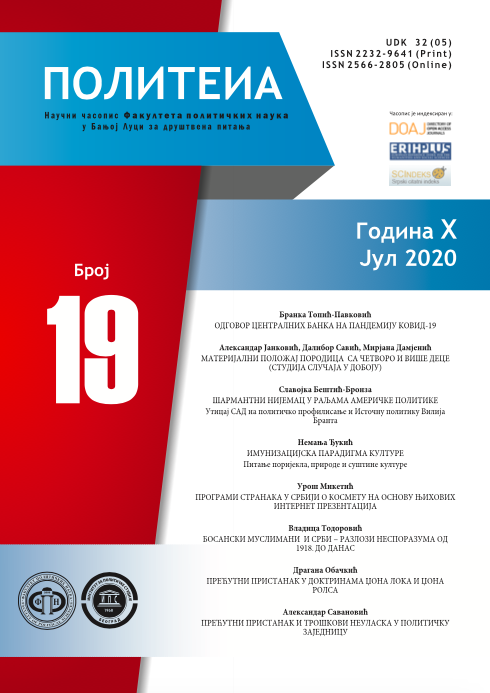TACIT CONSENT AND COSTS OF NON-ENTRY INTO THE POLITICAL COMMUNITY
Abstract
This paper offers an analysis of an issue related to the social contract theory The issue concerned is disagreement in the form of tacit consent. Namely, if we accept the model of tacit consent, then an issue of costs of this disagreement is raised. These costs cannot be treated in the same way as in the case of express consent. The reason is that, in the case of tacit consent, a person does not have same chances and opportunities as others. This offers a possibility of claiming discrimination, especially if we accept the fact that these costs can be so high so that they deny the possibility of choice. At least in a practical sense and de facto. So, this topic must be understood properly if we want the social contract theory to function well. In this paper, we will try to do that through a logical and semantic analysis of basic terms: tacit consent, disagreement, and costs of contract.
References
Beran, H. (1987). The Consent Theory of Political Obligation. London: Croom Helm.
Bennett, J. (1979). Tacit Consent and Property Rights. The Philosophical Review, 88(2): 224-234
Buchanan, A. (1991). Secession – The Morality of Political Divorce from Fort Sumter to Lithuania and Quebec. San Francisco: Westview Press.
Buchanan, J. (1975). The Limits of Liberty: Between Anarchy and Leviathan. Chicago: University of Chicago.
Cassinelli, C.W. (1959). The "Consent" of the Governed Western Political uarterly, 12 (2): 391-409
Edmundson, W. (1998). Three Anarchical Fallacies – An Essay on Political Authority. Cambridge: Cambridge University Press.
Gilbert, M. (2006). A Theory of Political Obligation. New York: Oxford University Press.
Green, A. (2012) Against obligation – The Multiple Sources of Authority in a Liberal Democracy. Harvard University Press.
Hobbes, T. (1998). Leviathan. New York: Oxford University Press.
Klosko, G (2005). Political Obligations. New York: Oxford University Press.
Locke, J. (1980). Second Treatise of Government. Indianapolis: Hackett Publishing Company.
Rothbard, M. (1998). The Ethics of Liberty. New York: New York University Press.
Savanović, A. (2019). Teorija Republike. Banjaluka: Fakultet političkih nauka.
Savanović A. (2019a). Paradoks prinudnog pristanka u teoriji društvenog ugovora. Politeia, IX (17): 25-38.
Simmons, J. (1976). Tacit Consent and Political Obligation. Philosophy & Public Affairs, 5(3): 274-291.
Thornthon, B. (2014). Democracy’s Dangers and Discontents – The Tyranny of Majority from the Greeks to Obama. Stanford: Hoover Institution Press.
Autori koji objavljuju u ovom časopisu pristaju na sljedeće uslove:
- Autori zadržavaju autorska prava i pružaju časopisu pravo prvog objavljivanja rada i licenciraju ga "Creative Commons Attribution licencom" koja omogućava drugima da dijele rad, uz uslov navođenja autorstva i izvornog objavljivanja u ovom časopisu.
- Autori mogu izraditi zasebne, ugovorne aranžmane za neekskluzivnu distribuciju članka objavljenog u časopisu (npr. postavljanje u institucionalni repozitorijum ili objavljivanje u knjizi), uz navođenje da je članak izvorno objavljen u ovom časopisu.
- Autorima je dozvoljeno i podstiču se da postave objavljeni članak onlajn (npr. u institucionalni repozitorijum ili na svoju internet stranicu) prije ili tokom postupka prijave rukopisa, s obzirom da takav postupak može voditi produktivnoj razmjeni ideja i ranijoj i većoj citiranosti objavljenog članka (Vidi Efekti otvorenog pristupa).

